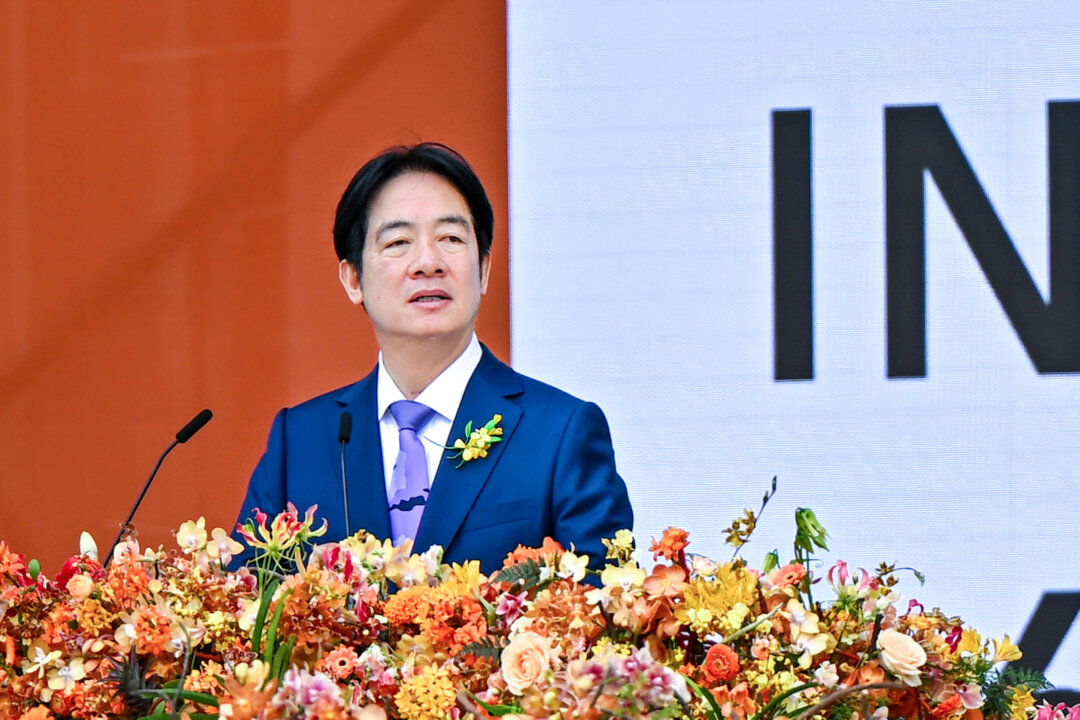The Taiwanese leader said a videotaped address the Chinese regime has been distorting Resolution 2758 in support of its ‘one China principle.’
Taiwanese President Lai Ching-te said in a videotaped address played at a U.N. meeting on Sept. 24 that China’s communist regime wants to do more than extinguish the island’s democracy.
“China’s threat to Taiwan is a threat to the entire international community,“ Lai said. ”China doesn’t just want to change the status quo in the Taiwan Strait. It intends to change the rules-based international order and achieve international hegemony.”
The videotaped address was shown to an audience at the Concordia Summit, a conference on the sidelines of the 79th session of the U.N. General Assembly in New York City.
Taiwan withdrew from the United Nations in 1971 after the U.N. General Assembly passed Resolution 2758, which handed Taiwan’s U.N. seat to China. Since then, the self-ruled island has been excluded from formal participation in U.N. meetings and activities because of Beijing’s opposition.
Lai said the Chinese regime has been distorting Resolution 2758 in support of its “one China principle,” falsely claiming that the document gives Beijing the right to claim sovereignty over Taiwan and that the island has no right to participate in the U.N. system and other international forums.
The president thanked the United States and the Inter-Parliamentary Alliance on China (IPAC) for taking action to oppose Beijing’s interpretations of the resolution.
The IPAC, a global alliance consisting of hundreds of lawmakers, introduced an initiative in July, with members pledging to pass resolutions in their own parliaments to reject Beijing’s reading of Resolution 2758. Since then, the Australian Senate and the Dutch House of Representatives have followed through with the pledge.
In May, a bipartisan group of U.S. senators wrote a letter to World Health Organization (WHO) Director-General Tedros Adhanom Ghebreyesus, urging him to support Taiwan’s participation in the World Health Assembly (WHA).
“Taiwan’s exclusion from the WHO and WHA undermines the WHO’s mission to build a healthier future for the global community,” the letter reads.
The senators also said Beijing had tried to use the resolution “as a pretext to obstruct Taiwan’s engagement with the international community.”
Lai pointed out that the Chinese Communist Party (CCP) has been escalating its aggression in the Indo-Pacific, causing instability in the rules-based international order.
“We have seen China intensifying its military intimidation in the Taiwan Strait and the East and South China Seas. Through its use of gray-zone tactics such as economic coercion and cognitive warfare, China poses serious threats to global peace and stability,” Lai said.
The Taiwanese president reiterated his previous call, urging like-minded countries to unite under a “democratic umbrella.”
“Our sincere hope is for Taiwan and other democratic nations to jointly support the democratic umbrella and counter authoritarian aggression as we navigate a new era in global democratic development,” Lai said.
President Joe Biden, in a keynote address to the U.N. General Assembly on Sept. 24, said the United States “is unabashed” in maintaining peace and stability across the Taiwan Strait.
In response, Taiwan’s foreign ministry issued a statement thanking Biden for his “consistent public support for cross-strait peace and stability during his term in office.”

After Lai’s video address was played, Alexander Tah-ray Yui, Taiwan’s top representative to the United States, and Keith Krach, former U.S. Under Secretary of State and chairman and co-founder of the Krach Institute for Tech Diplomacy at Purdue University, both said at the summit that the CCP and its leader, Xi Jinping, see Taiwan’s democracy as a “big threat.”
“Taiwan is certainly a beacon for freedom and democracy, not just in the region but around the world,” Krach said.
“It dispels [Xi’s] myth that the Chinese culture cannot live and thrive within a democracy, so he wants it destroyed.”
Yui said the CCP believes that Taiwan’s freedom and democracy threaten its legitimacy.
Last year, CIA Director William Burns said Xi had instructed his military to be ready to invade Taiwan by 2027.
Yui also pointed out that China’s domestic security spending is higher than its military budget, meaning that the CCP sees the citizens as its biggest enemy.
Adrian Zenz, senior fellow and director in China studies at the Victims of Communism Memorial Foundation, estimated that China’s spending on domestic security reached 1.24 trillion yuan—about $193 billion—in 2017, which was about 19 percent higher than its spending on external defense, according to his analysis published by the Jamestown Foundation in 2018.
Yui said that as countries advance their technology, it is important that the democratic side takes the lead.
“Trust in technology is very important,” Yui said. “It’s so important for us, the democratically like-minded countries, to make sure … the technology that we hold and we’re developing is always a step ahead or many steps ahead of the other side.
“We use it to enhance, to better human livelihoods; the other side uses it to control its people.”
Yui said that Taiwan plays an indispensable role in advancing technology worldwide, given the country’s leadership in producing semiconductors. According to Yui, Taiwan produces about 60 percent of the world’s semiconductors and 92 percent of the world’s advanced semiconductors.
“To talk about the future—which is technology—without incorporating Taiwan is like going [to] downtown New York in Little Italy and getting a cannoli without its filling,” Yui said. “If you’re talking about the future without Taiwan, you will be left behind.”
After the session, reporters asked Yui whether Taiwan had any concerns about the outcome of the U.S. presidential election in November. In response, Yui said that Taiwan enjoys strong bipartisan support in Congress.
Yui said the outcome will not change the level of U.S. support for Taiwan amid the ongoing threats the Chinese regime poses to the United States.
Edwin Huang contributed to this report.

